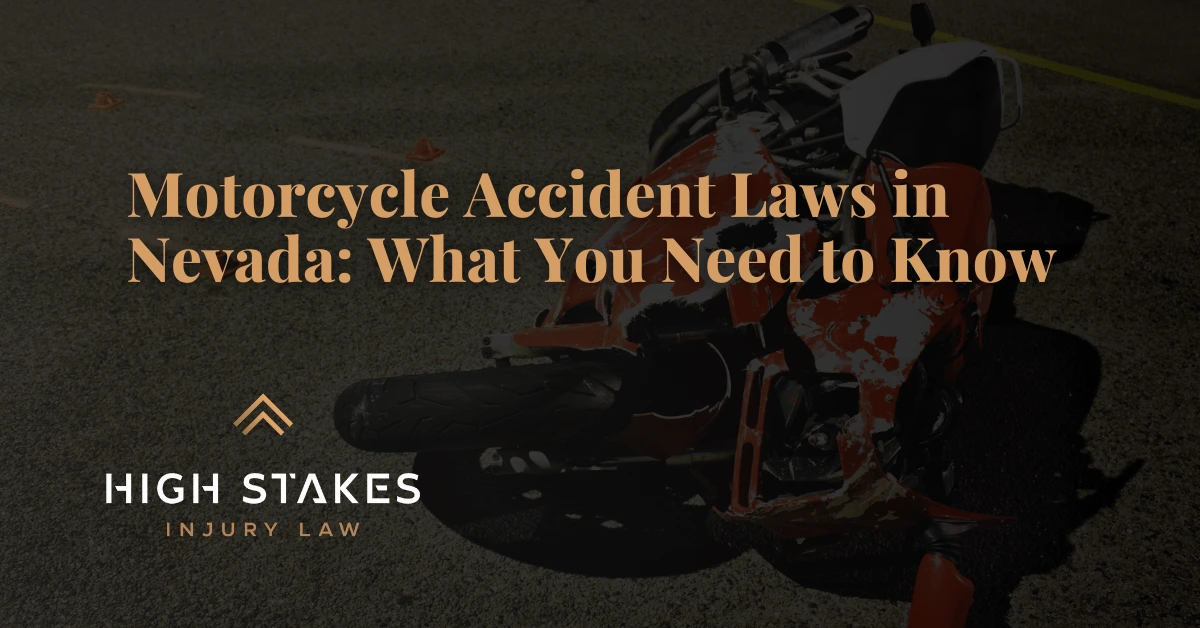Motorcycle accidents can lead to severe injuries, financial hardships, and legal complications. If you or a loved one has been involved in a motorcycle crash in Nevada, understanding the state’s motorcycle laws and your rights is essential.
At High Stakes Injury Law, we have years of experience helping injured motorcyclists in Las Vegas and throughout Nevada seek the compensation they deserve. Our team understands the complexities of motorcycle accident claims and is here to guide you through the legal process.
In this blog, we cover everything you need to know about motorcycle accident laws in Nevada, including helmet requirements, lane-splitting regulations, how fault is determined, and what compensation may be available. We also explain how our team at High Stakes Injury Law can help protect your rights and fight for the compensation you deserve.
How Do Motorcycle Accidents Differ From Other Vehicle Accidents?
Motorcycle accidents present unique challenges compared to collisions involving cars or trucks. Unlike passengers in enclosed vehicles, motorcyclists lack protective barriers, making them more vulnerable to severe injuries.
Additionally, Nevada’s motorcycle laws—such as helmet requirements and lane-splitting regulations—can impact accident claims, liability, and compensation.
Nevada’s Helmet and Safety Gear Laws
Under Nevada Revised Statutes (NRS) 486.231, all motorcycle riders and passengers must wear a helmet that meets Department of Transportation (DOT) standards. This law is in place to reduce the risk of fatal head injuries and traumatic brain injuries (TBIs).
Failing to wear a helmet not only results in fines but can also impact a personal injury claim. If a motorcyclist suffers a head injury while not wearing a helmet, the insurance company or at-fault party may argue that the injury was worsened due to non-compliance with safety laws. This could reduce the compensation the rider is eligible to receive under Nevada’s comparative negligence laws.
Other Required Safety Gear
In addition to helmets, Nevada law requires:
- Protective face shields or goggles (unless the motorcycle has a windshield)
- Protective gloves and sturdy footwear (recommended for safety but not legally required)
- Reflective or brightly colored clothing to improve visibility
Is Lane-Splitting Legal in Nevada?
Lane-splitting, the practice of riding between lanes of slow-moving or stopped traffic, is illegal in Las Vegas and throughout Nevada. Motorcyclists must follow the same lane-use rules as other vehicles.
While some states, such as California, allow lane-splitting to reduce traffic congestion, Nevada law prohibits it, and violating this rule can result in:
- Fines and traffic citations
- Increased liability in an accident claim
- Reduced compensation if the insurance company argues that lane-splitting contributed to the crash
If you were involved in an accident where lane-splitting occurred, it’s important to discuss your case with a motorcycle accident attorney to understand how it may affect your claim.
Who Is at Fault in a Nevada Motorcycle Accident?
Las Vegas follows a modified comparative fault rule when determining liability in motorcycle accidents. This means:
- If you are less than 50% at fault, you can still seek compensation.
- If you are found 50% or more at fault, you cannot recover damages.
- Your compensation is reduced by your percentage of fault.
For example, if a motorcyclist is found 30% at fault for an accident, they can still recover 70% of the total damages. However, insurance companies often try to shift blame onto motorcyclists, making it crucial to have a personal injury attorney who can fight back against unfair fault assignments.
Common Causes of Motorcycle Accidents in Nevada
Motorcycle crashes can happen for many reasons, but some of the most common causes include:
- Distracted driving – Drivers using phones, adjusting radios, or not paying attention to the road
- Failure to yield – Drivers turning left in front of motorcycles or merging without checking blind spots
- Speeding – Excessive speed reduces reaction time and increases the severity of collisions
- Road hazards – Potholes, loose gravel, and uneven pavement pose greater risks to motorcycles
- Driving under the influence (DUI) – Impaired drivers are a major cause of fatal motorcycle crashes
If another driver’s negligence caused your accident, you may be entitled to compensation for your medical bills, lost wages, and pain and suffering.
Types of Compensation Available for Motorcycle Accident Victims
Victims of motorcycle accidents in Las Vegas may pursue various types of compensation, including:
1. Economic Damages
These cover financial losses such as:
- Medical expenses (emergency care, surgeries, physical therapy)
- Lost wages and reduced earning capacity
- Property damage (motorcycle repair or replacement)
2. Non-Economic Damages
These compensate for intangible losses, including:
- Pain and suffering
- Emotional distress
- Loss of enjoyment of life
3. Punitive Damages
In cases of extreme negligence (such as a drunk driver causing a motorcycle crash), courts may award punitive damages to punish the at-fault party and deter reckless behavior.
What to Do After a Motorcycle Accident in Nevada
Taking the right steps after an accident can protect your health and legal rights. If you’re involved in a motorcycle crash, follow these steps:
- Call 911 – Report the accident and request medical assistance.
- Seek Medical Attention – Even if injuries seem minor, get evaluated by a doctor.
- Document the Scene – Take photos of your injuries, the accident site, and vehicle damage.
- Gather Witness Information – Collect names and contact details of anyone who saw the accident.
- Avoid Speaking to Insurance Companies Alone – Insurers may try to minimize your claim—consult with a personal injury attorney before giving any statements.
Contact the Las Vegas Motorcycle Accident Lawyers at High Stakes Injury Law Now
If you or a loved one has been injured in a Nevada motorcycle accident, don’t wait to get legal help. Call High Stakes Injury Law at (702) 605-6671 for a free case evaluation or visit our website to schedule a consultation. We’re here to help you navigate the legal process and fight for the compensation you deserve.


